
San Francisco. Montreal. Toronto. These are some of the leading regions for game development across North America. Smaller cities like Austin, Texas are making their mark too, but the next big push could actually come from lesser-known Rochester, NY. The “Flour City” was the largest flour-producing city in the 19th century, and went on to become a titan of industry in the 20th with companies like Eastman Kodak, Bausch & Lomb and others. The 21st century has been a different story, but many believe that Rochester is poised for a revival and that games will play a big part.
The ingredients for a game hub to be cultivated are in place. First and foremost, there is an abundance of talent coming out of universities in Rochester. Rochester Institute of Technology (RIT) has been ranked fifth at the undergraduate level and seventh at the graduate level by Princeton Review. And RIT’s Center for Media, Arts, Games, Interaction and Creativity (MAGIC) offers a research laboratory and production studio that helps students bring ideas from prototype to commercial production.
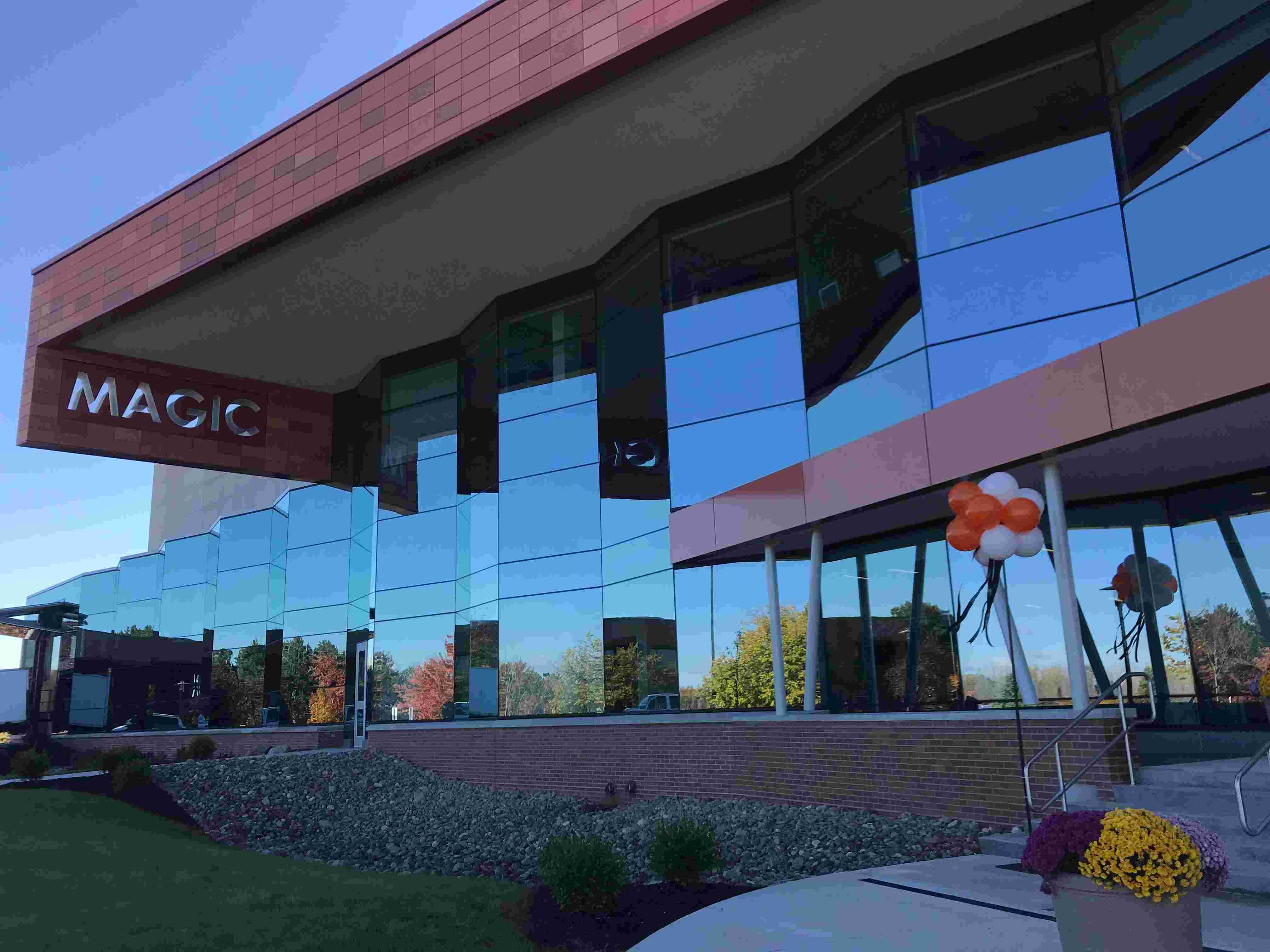
But because there’s so little opportunity currently in Rochester, many talented graduates gain employment with top companies like Microsoft, Rockstar Games, Sony Interactive Entertainment, Valve, etc. Rochester is suffering from serious brain drain.
“Rochester has, I think, a disproportionate amount of talent, compared to its industry size,” said Keith McCullough, COO at Rochester-based developer Workinman Interactive. “I don’t know why, whether it’s because of the schools, or because the people, or because of the art community here, whatever it is, but Rochester’s talent is incredible, way outsized for how much work there actually is to go around for that talent.”
Workinman is just one of a handful of small to midsize studios that exist in Rochester, including Darkwind and Second Avenue Learning. “Without RIT we wouldn’t have Workinman, we wouldn’t have [our spin-off] Bread Machine, and we wouldn’t have a Second Avenue or a Darkwind here, either,” emphasized Workinman CEO Jason Arena.
RIT gets the most press for its game curriculum, but there are other programs popping up to complement it.
“We have emerging programs at St. John Fisher and University of Rochester, as they both have computer science or interactive media programs, and they’re both growing them actively,” noted Victoria Van Voorhis, CEO of Second Avenue Learning, adding that the renowned Eastman School of Music also recently started up a new master’s degree program in composing for video games.
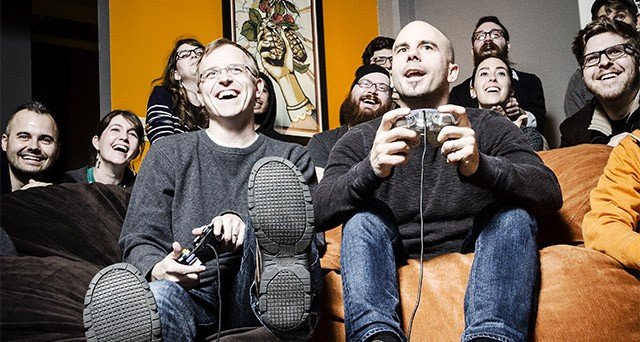
The history of interactive entertainment is preserved at The Strong National Museum of Play, which hosts a comprehensive collection of games and design papers, as well as the World Video Game Hall of Fame. And the museum’s announcements tend to get national attention for Rochester, especially when the space is used for incredible events like the Women in Games celebration.
“I was there doing research for an upcoming interactive history on a serious game that we’re doing on women’s suffrage,” Van Voorhis continued. “I can walk over there and research the history of the art, and my team is going over there next week to play through a bunch of digital history games and board games to help us with our game design for this next product that we’re building. I get to tap collections, you know, that people would give their eye teeth for in any other market, right? That helps inform the depth of what we can do. My developers can go over and read Will Wright’s papers.”
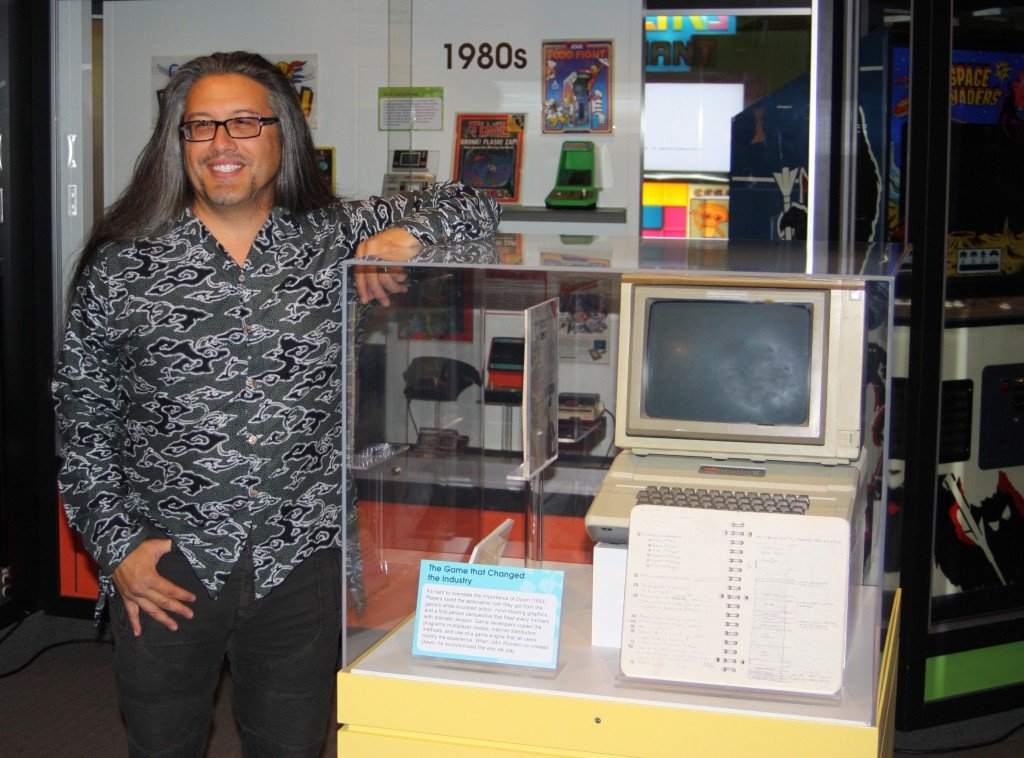
One of the biggest challenges facing Rochester before it can ascend to game hub status is raising awareness. John Scalzo, a librarian who also organizes a small annual games expo called Rochester Games Festival, is hoping to shine a spotlight on some of the creative products local developers make.
“Probably the biggest hurdle of promoting the first Game Fest last year was that no one had any idea game development was even happening in Rochester,” he stated bluntly. “I’d show up someplace with the poster saying, ‘Hey, would you like to put up this poster for the Rochester Game Festival?’ They would look at me like I was crazy, like, ‘Who makes games in Rochester?’
“The first year we had 500 people come to attend… And then in 2018 w moved to RIT, we got 1000 people total to come, so we doubled. So people are definitely getting on board with this.
“Rochester’s kind of built for gaming. I went to RIT 15, 20 years ago. And there was still a strong gaming group back them. MAGIC hadn’t started yet, even the game development major hadn’t started yet, but there was still lots of people interested in games and there were people interested in making Rochester a place to play games and to make games. It’s always been in our DNA.”
A game festival is all well and good, but to truly make the larger industry in the US aware of Rochester’s talent, local developers must come together for their own cause. That’s where Roc Game Dev comes in, a collective that recently opened a co-working space for developers and often hosts game meet-ups. Rob Mostyn is one of the co-founders but he’s also serving in the important role of Digital Games Hub Coordinator for RIT.
“My current position exists through a state grant called the Digital Gaming Hub Grant,” he said. “We’re trying to push this narrative. People don’t know that games are being made in Rochester. That’s something we’re trying to do. We’re trying to at least be a bullet point on the mayor’s public talk about Rochester, mentioning that games are being made, just trying to gather that attention about Rochester and New York State as a whole.”
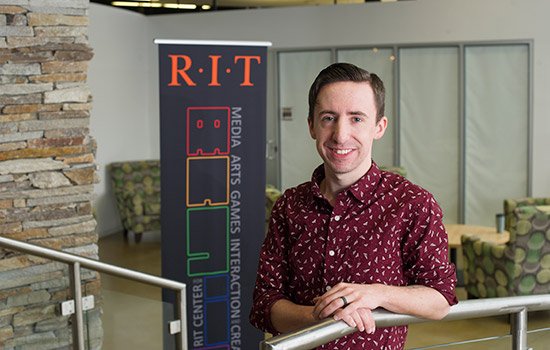
Van Voorhis couldn’t agree more, citing the actions of public officials in Austin. “In Austin, they just got the mayor to say that they were a gaming hub,” she said. “All of a sudden, Austin is starting to be a gaming hub. It needs to be part of our community message. It needs to be part of our community’s identity.”
AR smart glasses maker Vuzix isn’t explicitly tied to the games industry, but their Rochester presence does show that the city can be on the cutting edge of technology again. The tech firm was able to secure a $25 million investment from Intel, and even that didn’t get the publicity it probably should have.
“We see this actually being a [tech] hub like… a West Coast kind of environment, but here on the East Coast,” Vuzix CEO Paul Travers told me. “The US government was going to put $100 million into photonics and stuff around Rochester and many of that never materialized, but the amount of press that they got for pretending to do that stuff, and a lot of it not even happening, kind of blew me away when you think about the fact that little Vuzix here is bringing in giant Intel, $25 million in one whack, and it was real and it showed up as a footnote in the Rochester Business Journal. We’re not complaining.
“I’m just saying Rochester could help itself better. It doesn’t do a good job of making a big deal out of the companies that are here, because there’s a lot – I mean, Vuzix is one of a bunch of companies that I think are as good as any West Coast company’s ever going to be.”
Van Voorhis added, “A couple of years ago, I gave a talk where I talked about how Rochester is uniquely positioned to really have a breakout century in many ways because we have an incredibly vibrant creative class and an incredibly vibrant technical class here. If we can get the capital together to fuel that economy, I think we can do great things. That’s part of retelling the story of Rochester. As we’ve seen some of our stakeholder employers go through dislocation, the creative destruction of certain industries is an opportunity for us to give birth to new foundational industries in this town.”
From a game development perspective, Van Voorhis said that Second Avenue and a number of others are looking to charter a digital gaming industry association “so that we can advocate at the city level, the county level, and the state level to support this industry in its growth, because it keeps creative talent here.”
Furthermore, Mostyn is also in discussions with the IGDA to start up a local chapter in Rochester.
“We don’t want to be a great exporter of talent,” he lamented. “We want to keep some of them. But understandably, they have to find work. If that’s not here, they’re going to look for it elsewhere. But how do we keep them?”
As it usually does, money rears its ugly head. Without a large number of game development studios to support young talent, graduates are forced to look for money in major hubs often on the West Coast or in Canada. And for the brave souls who decide to stay in Rochester and form their own studios, it’s incredibly hard to raise capital. It doesn’t help any that tax incentives are few and far between, unlike north of the border in Canadian provinces like Ontario and Quebec.
“You have to get money from outside the city. There’s no venture capital, there’s no avenues to get funding,” described McCullough. “If you lived in San Francisco, there’d be lots of different places and people you could talk to to try to raise funds. If you want to get venture capital, you have to fly to California like 15 times, which is crazy expensive and time consuming.
“I can’t think of a bigger barrier. Everything else is this and that and the other thing. But until there’s some way for anyone to actually make a living being in dev in Rochester, I don’t know how you could be a dev in Rochester.”
Pete Lazarski, who runs Twitch channel Imaginary Monsters and works as art director at Workinman, chimed in, “I think a lot of the business development that we wind up doing, for Workinman and Bread Machine, is just high effort, high cost. People have to be moving around to be in a place where that money is going to be found, essentially.”
What that means for the few studios that produce games in Rochester currently is they have no choice but to engage in service-based businesses. Workinman, for example, does a lot of work for Nickelodeon.
“I think that’s the model for most of the companies here in Rochester,” said Arena. “We’re service-based, we’re trying to eke out margins… We’re not making enough money to self fund a legitimate IP project. We’re making small games that take a long time, and you need real money to make these things. And if you’re a service-based company, you’re always managing people and resources, and it’s limited. So we’re sometimes stifled because of time, or we’ve got to pull people off, and we lose steam, or we can’t make the game we really want to make.
“And then on top of that, marketing [is a challenge]. We can make the best game in the world, but without a substantial marketing budget, we’re not going to hit the app store and do well, we’re not going to get on Steam or PS4 and that’s the reality of it. Marketing might be even more than the budget for creating the game.”
There may be some light at the end of the venture capital tunnel, however. Investments are starting to appear, but they still haven’t been geared specifically to interactive entertainment.
“We’re seeing an emergence of venture capital here now with the great work that’s happening with Chloe Capital to help fund women-owned businesses, and the VC firm Excell Partners, Rami Katz and Theresa Mazullo, just got some state money to help expand the VC footprint,” explained Van Voorhis. “What I think really needs to happen is we need to create connections to the private equity and venture markets in New York, Chicago, and San Francisco, so that they see Rochester as an attractive place to do business, and we can become part of the those funds’ ecosystems, because if they have a nexus of companies where they’re making investments, then it is worth their time to actually show up here, because investors like to be able to look over their investments’ shoulders and make sure things are going.
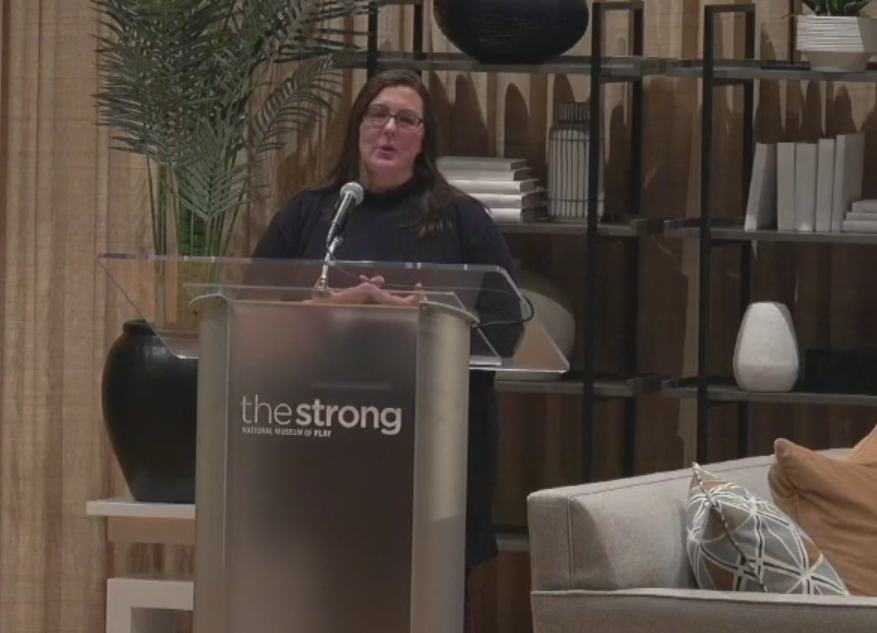
“If you’re in New York City, and you have venture capital, it’s going to take you an hour to get anywhere to visit your investment. Breaking down some of the geographic barriers and telling a fundamentally different story about Rochester not being the Rust Belt, not being the town of could-have-beens, but the town of could-bes, and tapping into the fabulous talent that we have in terms of design and engineering [will be key].”
When the pieces start falling into place, Rochester should be able to host a studio on the scale of a Vicarious Visions (Guitar Hero, Skylanders, and some Destiny 2), which is just north of the capital in Troy, NY. Better yet, if one of the majors like EA, Ubisoft or Microsoft decided to open a satellite, it could become a domino effect.
“I would love to have a couple of big anchor studios locate here,” Van Voorhis continued. “That ups the level of talent for all of our studios, right? And then we’re going to end up producing even better product. We’ve got great talent, but having those kinds of studios here ups the game. It also gives people the sense that there is enough of an industry to take the risk to relocate here, so that they have the ability to move from studio to studio, to progress up through the ranks, and if they have a spouse that’s also in the industry, they have a better chance of being able to have that spouse or partner employed. When I lose people, I lose them to Austin, or the Valley, because they’ve got a spouse or a partner that got a job out there, and it’s much easier for them to follow and get a job than to find a job for their partner here.
“If we can grow the footprint of the industry here, I think it will help the economy, help the caliber of what we’re producing, and really give us some fuel to have a much more dynamic presence in the market.”
After all, if some of the RIT grads are going on to work for the Rockstars of the world, couldn’t one of the majors open a satellite with comparatively low overhead and attract local Rochester talent more effectively to feed their development pipeline?
“I think people that might be coming from outside to potentially invest some money or start a studio here or have a branch studio, I think they’d be surprised at the amount of talent that is just sort of lurking and waiting and ready,” affirmed Laszarski.
It may be hard financially for Rochester studios to travel and advocate for themselves on a regular basis at the Game Developers Conference and other events, but as the region’s industry association continues to coalesce, resources will be pooled and you might just see a “Made in Rochester” booth. In the meantime, optimism is starting to take hold.
“Go back three years ago when this was just twinkles in our eyes, and a lot has progressed since then,” said Laszarski. “It’s a much more inviting landscape for people to kind of enter into now at this point than it was back then because people have been doing work and it’s been getting set up and we’ve been seeing some results.”
 GameDaily.biz © 2025 | All Rights Reserved.
GameDaily.biz © 2025 | All Rights Reserved.